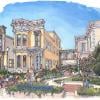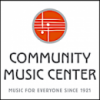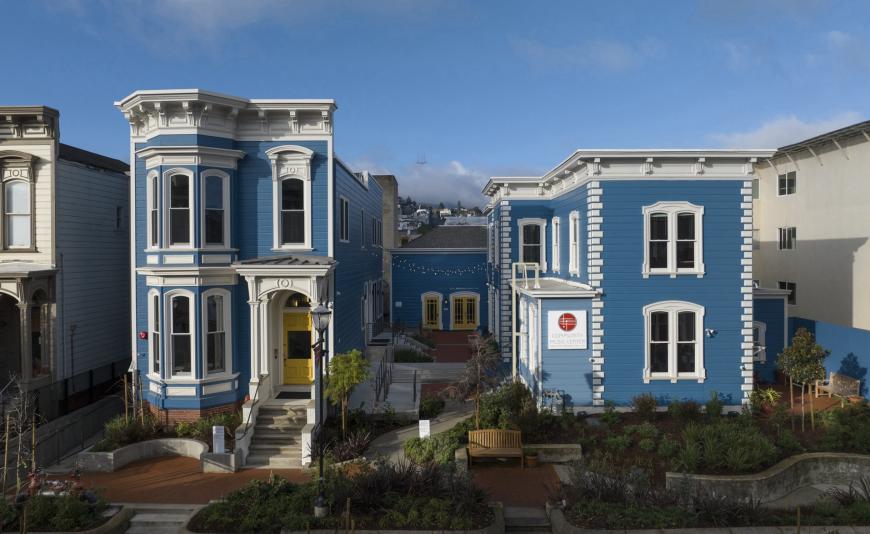
On Wednesday afternoon, Feb. 21 — a break between the storms — students, administrators, faculty, and the Mission District community gathered to celebrate the expansion of the Community Music Center with a celebrity-blessed ribbon-cutting ceremony.
The new facility, a restored 140-year-old Victorian at 552 Capp St., has been painted a bright sky blue, as has its neighbor at 544 Capp, which has housed CMC since 1921. “They’re the same color because we want it to feel more like a campus,” says Julie Rulyak Steinberg, CMC’s executive director.
The exterior elements of the $15.1 million, year-and-a-half makeover include new parking, paving, and landscaping, including a Mozart Garden, where music of that composer was performed by a faculty quartet during Wednesday’s ceremony. A tour of 552 Capp confirmed how CMC’s stated belief “in the power of music to connect people, celebrate cultures, and transform lives” has been updated, facilitated, and expanded.
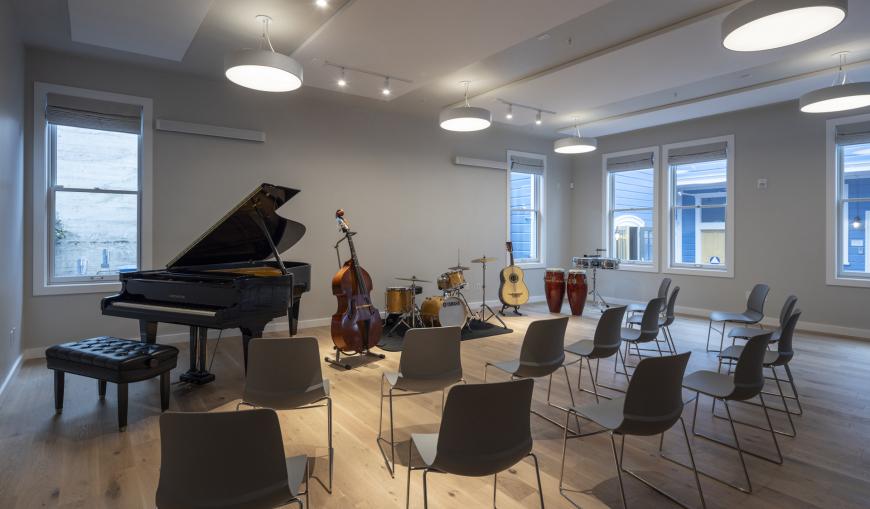
The front room of the building will be the main entrance to CMC and its registration space, as well as an area for faculty to copy materials and check on mail and email. The facility is completely ADA compliant, with an elevator accessing all three levels, and energy-efficient heating, cooling, and lighting are present throughout. A recital hall situated at the rear of the second level — where a refurbished Bechstein piano, a guitarrón, and a drum set were in evidence on the tour — is spacious enough for instruction and the rehearsal of mariachi and larger jazz ensembles, as well as small audiences. The room is handsomely wood-paneled and is soundproofed. Steinberg lauds architect Lisa Gelfand and construction operation Oliver & Company.
“These spaces will be activated for the community as well,” notes CMC Program Director Sylvia Sherman. “There’ll be a rental fee. But our students will also be performing here for community events, including the Mission Arts Performance Project,” which promotes neighborhood-wide musical celebrations on the first Saturday of every other month.
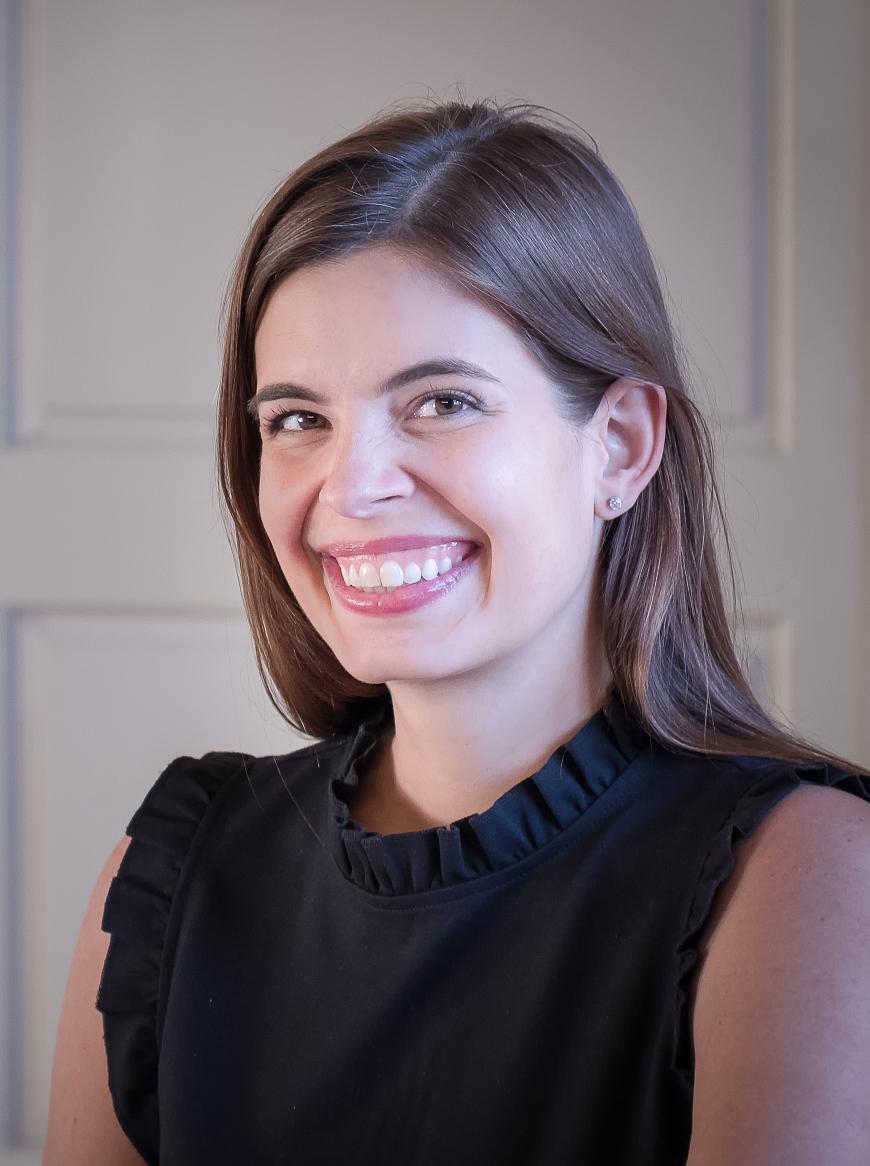
The building’s third level provides a set of smaller studios, including one with an array of new Yamaha Clavinovas, each with its own headphones. “This is a really good way for young people to begin piano,” notes Steinberg. “It’s a little less intimidating than going one-on-one with a teacher, and younger students can have a piano buddy sitting beside them. But the studio also provides for different kinds of improvisation classes.” Each of the new studios is equipped with storage space, whiteboards, and playback technology and is designed to maximize natural window light and good acoustics. The entire campus is wired with intercoms, improving communication between faculty and administration, and all spaces are keyed electronically, ensuring security and safety.
Opening up 552 Capp has of course transformed activity at 544 Capp. “There are so many spaces there that are freed up,” says Steinberg. “That will allow those spaces to be used for private teaching and for other group classes. And since registration is moving to the new facility, there’s a whole new ensemble room now [where the office used to be].
“That will create pathways, for example, for classical pianists who want to learn jazz to learn voicings, chords, and harmonic analysis so that when they get comfortable, they’ll be ready to get into one of the jazz ensembles. We also had the opportunity to do improvements at 544: a new roof, new siding, new windows, and an improved faculty space upstairs. And our staff has really grown, including people in marketing, to get the word out. We have no interest in being San Francisco’s best-kept secret anymore.”
Situated between the two buildings, CMC’s 130-seat concert hall, which was inaccessible during construction, will be reopened with its own improvements. “It now looks as nice as the music sounds, which it hasn’t always,” says Sherman. “Now we can control the lighting electronically, and we’re planning to do a little bit with the sound. After all, this is a venue where we’ve had everybody on the stage, from 6-year-old pianists to Frederica von Stade and everyone in between.”
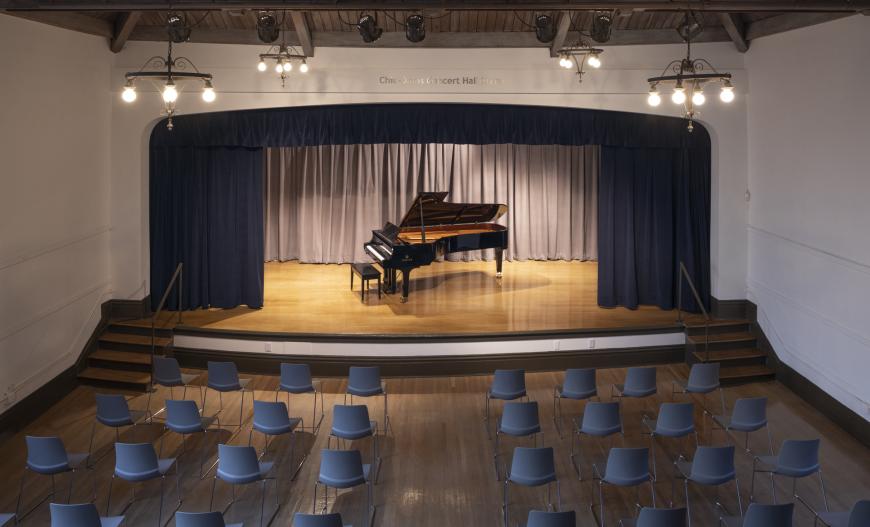
In collaboration with San Francisco Performances, the concert hall has also hosted the Alexander String Quartet, one of several professional ensembles with which CMC has established residencies — “because they know that they can reach a younger generation of aspiring musicians, who will also be their future audience,” says Steinberg.
“We pride ourselves on being a hub, a place where you can connect in whatever way makes sense for you,” adds Sherman. “For professionals it means one thing. For partners it’s another. For our students — whether it’s young people getting into music for the first time or older people returning to music after a long time — [it’s another]. Community responsiveness is the absolute root of what we do. I hope that, with this new facility, we’re going to continue to be able to live up to that reputation we’ve developed over the last 102 years and be able to serve more and more students.”
“The capacity of the new facility will be able to bring in an additional 900 students every year, which is almost double,” says Steinberg. “So we’re thinking a lot about resources, particularly when about 70 percent of our students either participate in a tuition-free program or receive financial aid here. We give away almost $3 million in direct aid to students every year, so for us, this building is a way to make sure that students who are seeking music education and struggle to obtain it have a place where they feel at home, feel welcome, feel part of the community. This is not a place that is gated or exclusive.”
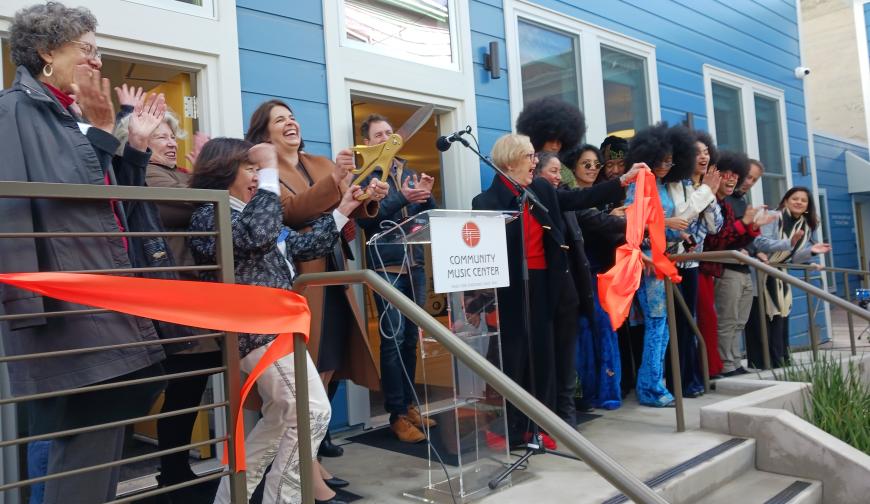
CMC networks actively with Mission District organizations and schools. “We have a historic relationship with the Mission Cultural Center, where our Young Musicians Program met for 11 years,” Sherman points out. “We have a strong collaboration with the school district’s mariachi program, and now we’re in 15 schools, largely concentrated in the Mission District, and more Latino kids and other kids of color are finding their way into music education. And because our teachers are in those schools, it’s a pathway for [students] to learn about scholarship opportunities at CMC.”
For Wednesday’s ribbon cutting, faculty member Marcus Shelby’s Teen Jazz Orchestra provided fanfare, and The Curtis Family C-Notes also performed. Mayor London Breed, Supervisor Hillary Ronen, and SFUSD Arts Department Director Ron Machado attended. Reservations for the grand opening on Sunday are filled, but you can get on the waitlist and find out more about CMC by visiting its website. The expansion will be celebrated throughout the month of March with free Friday concerts.



